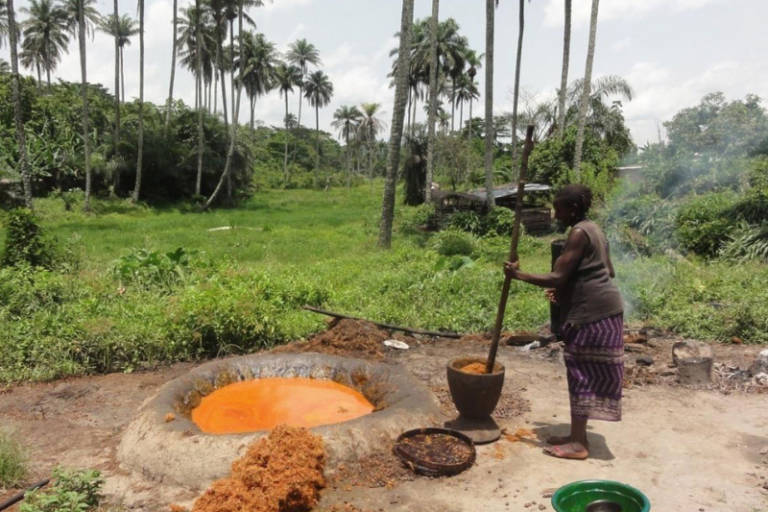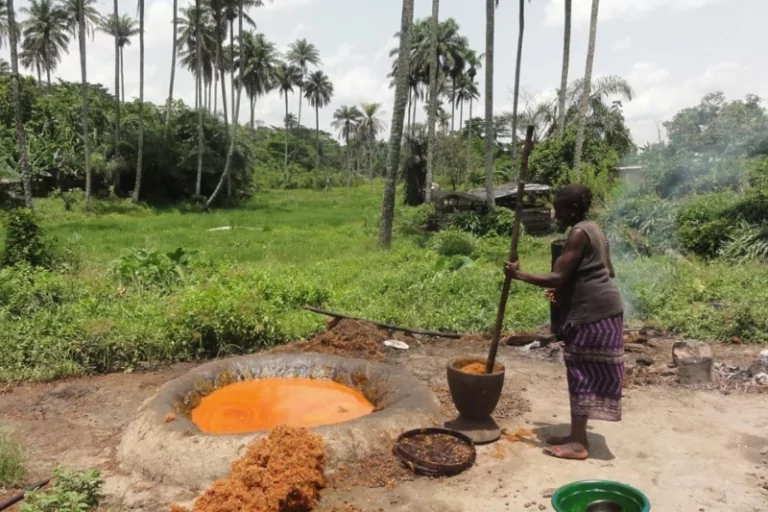

nifor to boost palm oil production in nigeria. what to worry
Nigeria is set to increase its palm oil production through a new partnership between the Nigerian Institute for Oil Palm Research (NIFOR) and Luscei Investment Limited.
Under the agreement, Luscei Investment will host NIFOR’s Extension Works Seed (EWS) fields and receive free seedlings for a 40-hectare field.
The private company will manage the planting, maintenance, and harvesting of the field under NIFOR’s supervision. The agreement is expected to last for 20 years and contribute to Nigeria’s palm oil industry.
The Executive Director of NIFOR, Dr Celestine Ikuenobe, expressed the need for partnerships to improve the institute’s operations.
The Director of Luscei Investment, Oluseyi Adeleke, stated that the collaboration has already improved the farm’s productivity and attracted major oil producers.
The Nigerian Institute for Oil Palm Research (NIFOR) is a research institute in Nigeria that focuses on studying and improving the production and processing of oil palm and other types of palms.
NIFOR plays a crucial role in improving the oil palm industry in Nigeria and West Africa. It was established in 1939 and is located in Benin City, Edo State, Nigeria.
NIFOR conducts research on genetic improvement, production techniques, and processing methods for oil palm, as well as other palms like Raphia, date, coconut, and ornamental palms.
The institute has a well-equipped research station with facilities for various areas of research, including plant breeding, agronomy, pathology, entomology, and processing.
NIFOR has developed improved varieties of oil palm that are more productive and disease resistant, and they have also developed technologies for processing oil palm fruits into oil, kernel, and other products.
Their research is not only beneficial for Nigeria but also for other countries in West Africa. NIFOR provides training to researchers and farmers from other West African countries and contributes to regional research projects on oil palm improvement and production.
Palm oil production is a big deal in Nigeria and Africa. Nigeria is the fourth-largest producer in the world, and Africa is the top producer.
This industry creates jobs for many people and helps the economies of African countries.
People are now focusing on sustainable palm oil production, which means producing it in a way that doesn’t harm the environment or the people who rely on it.
Many companies and organizations are working together to make sure palm oil is produced in a sustainable way. This is important for the future of the industry and the planet.
Palm oil is a versatile crop that can be used in a variety of products, including food, cosmetics, and biofuels.
The industry provides jobs for millions of people in Africa. Palm oil production can also be a source of foreign exchange for African countries.
Palm oil production is causing harm to the environment and people. The process of making palm oil involves cutting down trees and destroying habitats, which leads to deforestation and loss of animal homes.
The industry has also been accused of using forced labor and child labor, which is unfair and unethical.
Palm oil is a high-calorie food that can potentially lead to obesity and other health issues. The effects of consuming palm oil are quite complex and depend on various factors like the amount consumed, the type of palm oil, and overall diet.
Palm oil is high in saturated fat, which can raise cholesterol levels and increase the risk of heart disease. However, it also contains monounsaturated fat, which is considered healthier.
Some studies suggest that palm oil consumption can up the risk of heart disease, while others show no connection at all. So, more research is needed to fully understand the health effects.
The health effects of palm oil consumption are a little controversial. If you’re worried about it, you might want to limit your intake or opt for sustainably produced palm oil products. And of course, if you have concerns, it’s always a good idea to consult with your doctor!
Kenyan sprint star Ferdinand Omanyala finished second at the opening race of the Diamond League in Xiamen, China, on Saturday.…
The incessant rains have caused flooding in Durban and its neighboring areas. It has disrupted several core areas, with a…
Cross-border activity suffered vast disruption when the new ban started at midnight Thursday with its direct impact on border checkpoints…
South African Bank fined R700,000 after determining the institution misrepresented a credit product as an investment opportunity. Following its December…
EA Sports shows that Toronto Maple Leafs will stop their 58-year title wait by beating the Colorado Avalanche in seven…
Pope Francis, the first Latin American pope of the Roman Catholic Church, passed away in the morning of his 88th…
This website uses cookies.